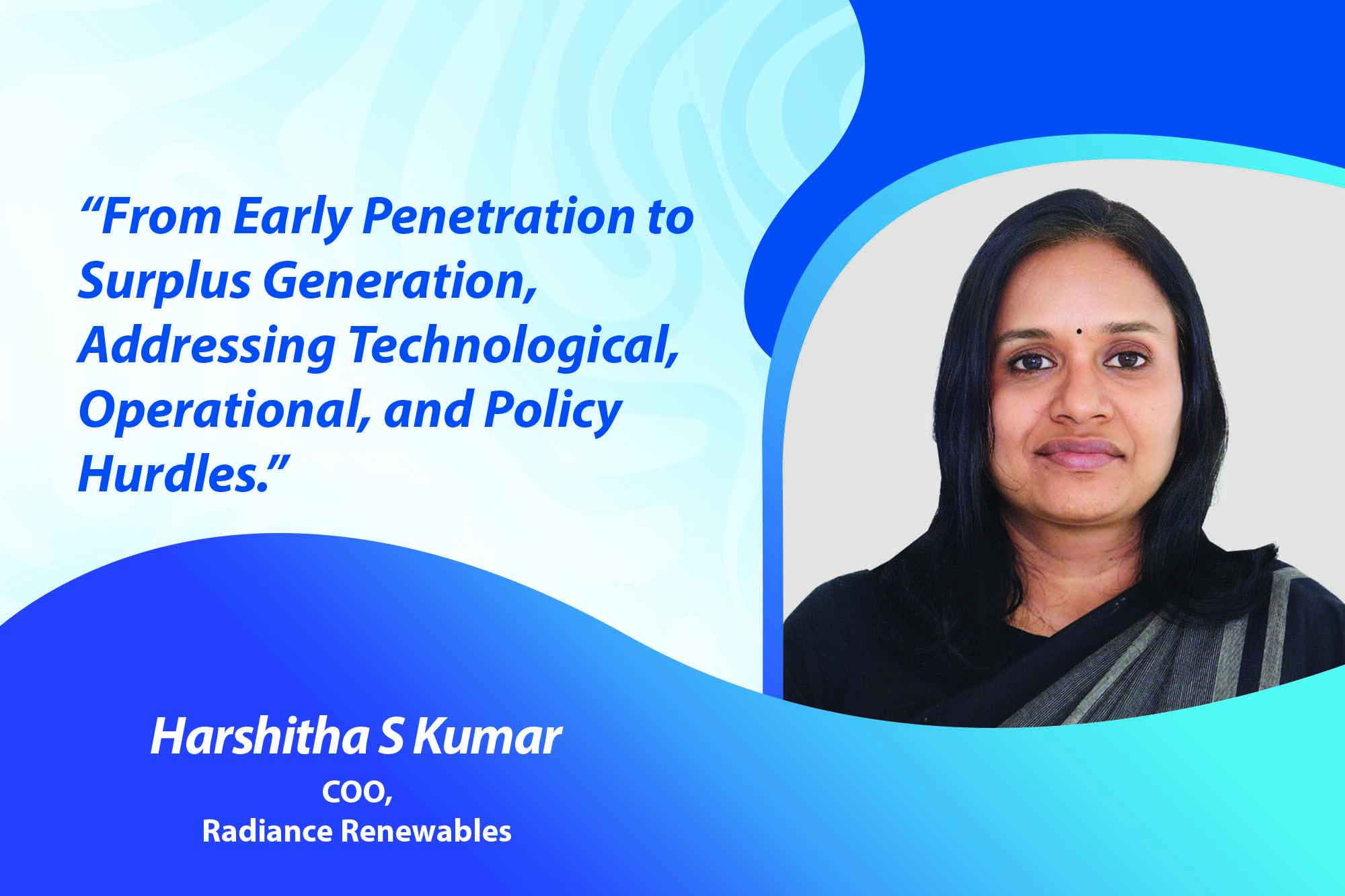Navigating the phases of renewable energy integration
By EPR Magazine Editorial June 25, 2024 5:55 pm IST
By EPR Magazine Editorial June 25, 2024 5:55 pm IST

From Early Penetration to Surplus Generation, Addressing Technological, Operational, and Policy Hurdles
Authored by: Harshitha S Kumar, COO, Radiance Renewables
Renewable energy integration into existing power grids undergoes several phases, each presenting unique challenges and opportunities. Initially, when renewable penetration is low, around 2 percent to 3 percent, its impact on the grid is minimal. This phase reflects the state of affairs in many countries from 2014 to 2015. As renewable penetration increases to about 10 percent, Phase 2 begins, where minor to moderate impacts on the grid are observed. India is in this phase, with states like Rajasthan, Gujarat, and Tamil Nadu advancing into Phase 3, touching around 20 percent penetration.
Phase 3 substantially impacts grid operations due to higher renewable integration. In contrast, Phase 4, exemplified by countries like South Australia and Denmark, sees renewable energy constituting a significant portion (30 percent–50 percent) of total generation. Phases 5 and 6 envision scenarios with surplus renewable energy spanning days, weeks, or seasons, highlighting challenges and solutions crucial for effective grid integration.
Technical hurdles include inadequate transmission infrastructure to accommodate increasing renewable capacities. Addressing this requires concurrent development alongside renewable installations. Real-time and accurate data acquisition becomes pivotal for centralised control and maintaining grid stability, minimising the need for sudden shutdowns or activations. Furthermore, balancing solar generation peaks with evening peak demand remains critical, necessitating innovative solutions like demand-side management and storage technologies.
The variability of renewables also leads to curtailment, dissatisfying investors. Enhancing distributed generation through rooftop solar programs alleviates grid stress but demands robust management at both local and distribution levels. System inertia, crucial for grid stability, requires bolstering, potentially through grid-forming technologies and synthetic inertia deployment.Policy-wise, grid codes often prioritise conventional sources over renewables, impacting investor confidence. Curtailment reduction measures and streamlined grid integration policies are imperative to foster a conducive environment for renewable investments. Implementing demand response mechanisms via advanced metering infrastructure and time-of-use tariffs can flatten demand peaks, optimising grid operations.
Power system flexibility encompasses demand-side management, power plant operational flexibility, and energy storage solutions. Integrating battery storage systems aids in balancing supply-demand dynamics, enhancing overall system stability. Moreover, regional energy trading facilitates surplus redistribution, mitigating localised deficits.
The trajectory of renewable energy integration hinges on technological advancements and supportive policies. As countries and regions navigate through different integration phases, adapting to these challenges with innovative solutions will be vital to realising a sustainable energy future.
While challenges persist in renewable energy grid integration, proactive measures in technology deployment and policy formulation offer pathways to overcome them. By enhancing grid flexibility, optimising operational efficiencies, and fostering a favourable investment climate, nations can effectively integrate renewable energy sources into their energy portfolios, paving the way for a cleaner and more resilient energy landscape.
We use cookies to personalize your experience. By continuing to visit this website you agree to our Terms & Conditions, Privacy Policy and Cookie Policy.